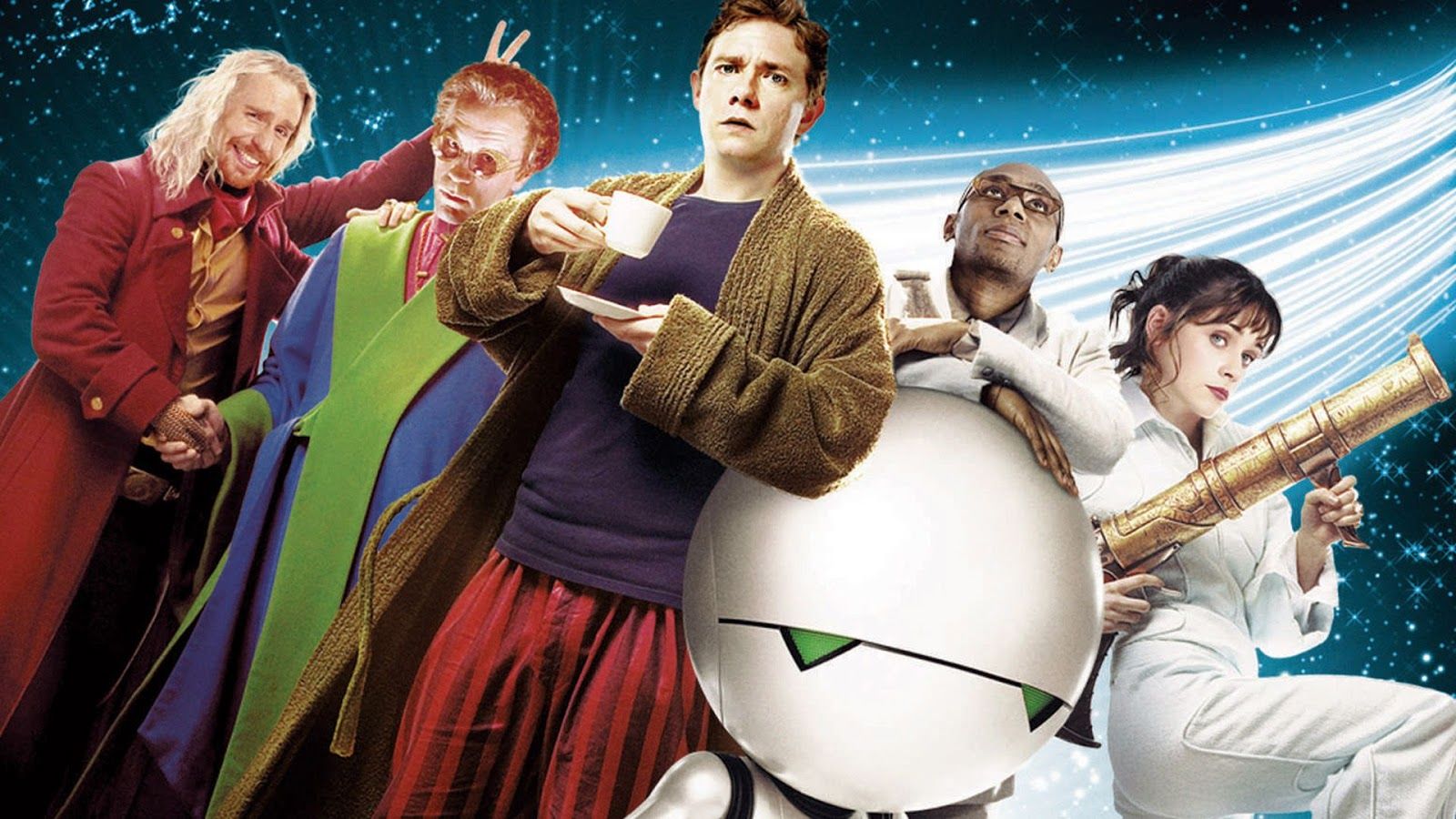HitchHiker's Guide to the Galaxy D.A.R.E review PT. 1
Hey readers, and welcome to The Reader in Yellow, the only reading blog on the internet to promise you the color yellow before hitting you with a black background! You're welcome, by the way, yellow's a killer on the eyes, and we all love dark theme anyways. I am your host, Aaron Hilomen, and today, Google thinks my name has been misspelled!Without further ado, let's get into a D.A.R.E review of a novel I'm sure EVERYONE has read by this point (spoilers ahead if you care about spoiling a book that's near 40 years old at this point):
I'm quite certain that most everyone has at the very least HEARD of HitchHiker's Guide to the Galaxy by this point in time, given that at the time of writing, we're leaning on the edge of the very beginning scenario presented in the novel. However, if I do not properly describe the novel to all you readers out there, I fear that East Side Union High School District Superintendent Chris D. Funk will enter my home and forcibly defenestrate me from the highest floor. Without further ado, let us get to the describing:
The story of Hitchhiker's Guide to the Galaxy follows one Jesus Christ... Sike! He's dead! The story of Hitchhiker's Guide to the Galaxy follows an unnamed young woman with a plan to- Gotcha again! She also dies! No, the story of Hitchhiker's Guide to the Galaxy truly follows one Arthur Dent, a man who is about to get his very home demolished, both on a regular and cosmic level. Set during the events following the destruction of the planet Earth, Arthur Dent must not only cope with both being the last human male to exist, but also realize how truly small and insignificant he is in the vastness of space, be put through events that are just as improbably as they are infinite, and suffer through bad poetry written by aliens. If this sounds like the plot of a cosmic horror story, then I must assure you that this came from the mind of Douglas Adams, and not the bigoted cat-owner known as Howard-Phillips Lovecraft.
Douglas Adams, who has once been described by acclaimed lunatic Aaron Hilomen as "Literally just Terry Pratchett, but y'know, in space and stuff," penned H2G2 (yes, I'm using an acronym, my poor fingers can't handle spelling it out again, fite me) with the intent to write a comedy. Now, given this was 1979, and comedy doesn't usually age well (Looking at you, "Divine Comedy"!), one would assume that this would be no different, however, many readers, myself included, find themselves laughing out loud at the pages of this wonderful little novel to this very day.
The characters of this novel tend to be defined by one or two key characteristics, but this is not necessarily a bad thing in the case of the story, as it leads to some humorous exchanges between persons. For example, the character Marvin is a depressed Alan Rickman robot, with his cynical personality and mechanical nature being the main feature of his character. This eventually leads into the humorous scene where the robot ends up (spoiler) inadvertently saving the main cast by speaking to a fellow computer and agitating it to the point where it made the decision to simply off itself and be done with it.
Other characters include Trillian, who basically encompasses the "sci-fi lady who spouts technobabble" trope seen in Star Trek, Ghost in the Shell, and The Matrix, I believe, among others. Despite this, she does manage to deliver a few humorous lines, usually by taking jabs at the straight-man that is Arthur Dent, and his wise-guy counterpart: Zaphod. Zaphod Beeblebrox plays the role of a cloudcuckoolander type, as he often seems to be not-all-there when it comes to his mental faculties. Egotistical and witty, Zaphod has some of the best lines in the novel, which manages to somehow strengthen the impact the audience gets during the reveal later on that Zaphod isn't all he seems to be. Then there's Ford. Many things can be said about Ford, but he mainly serves as a humorous way to deliver exposition with a few clever jokes thrown in before being shafted to a less prominent role during the latter half of the book.

Above: the cast of the Hitchiker's Guide to the galaxy film (which was more disappointing than the novel, as they were clearly skimping on the budget for Zaphod's second head)
Finally, there is the protagonist himself, Arthur Dent. Plenty can be said about him, mainly that he is the typical everyman. He often plays the straight-man to many of the humor in the novel, and nearly gets killed for analyzing poetry in an extensive manner similar to that required by the district. To say anything more on this subject would warrant Superintendent Chris Funk jettisoning me out into space via airlock, and thus nothing more shall be said. Alongside this, Arthur often fails to heed the sagely advice given by the in-universe Hitchhiker's guide that is "Don't Panic". It can be said that being the last known male human from earth is quite a stressful occupation.
In summary, despite its glaring lack of a giant robot fight or elder deities, H2G2 more than makes up for the loss in sheer wit and comedy, with lovable characters and a universe that can only really be understood if you put this fish in your ear. It's a timeless classic and honestly worth the read.
Pictured: This fish.
Some useful links:
https://www.amazon.com/Hitchhikers-Guide-Galaxy-Douglas-Adams/dp/0345391802
https://www.goodreads.com/book/show/386162.The_Hitchhiker_s_Guide_to_the_Galaxy
Yes I am should probably get some sleep. Yes, I'm driving myself insane.
Tune in next time for either an introduction post one blogpost too late, a comedic post, or my next D.A.R.E post, whichever I'm in the mood to finish writing first.

Comments
Post a Comment